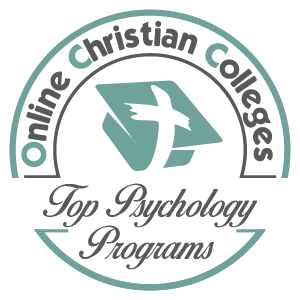
By OCC Staff
The study of the human mind is, in reality, a study of the human spirit. While it may seem that psychology is a strictly secular arena – particularly because of the fame of Freud, Skinner and other non-Christian experts – Christian Psychology programs are much more relevant due to their proper perspective of God’s creation (which includes the human brain!). Online Christian Colleges and Universities is pleased to share the Top Ten Online Psychology Programs.
The methodology for this ranking includes the number of different psychology degree programs available in a school as well as the specific focus of each degree program. Deference was given to Applied Psychology degrees ahead of Counseling degrees (which resolved some very close standings!). Other, more common factors were also considered: faculty/student ratio, admission, retention and graduation rates of the overall school as well as the availability of financial aid.
There will be some familiar names and a couple less familiar schools on this list; all are worth the time to investigate for any prospective student of the human mind. Online Christian Colleges and Universities is pleased to share the Top Ten Online Psychology Programs.
10. Indiana Wesleyan University
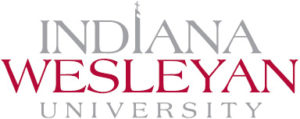 Bachelor of Science in Psychology of Human Relations
Bachelor of Science in Psychology of Human Relations
Marion, Indiana
Between Indianapolis and Fort Wayne lies the city of Marion, Indiana, home of Indiana Wesleyan University. In this idyllic semi-rural setting, on the south side of the city, the 320-acre campus enjoys the view of the Midwestern plains and a temperate climate. Founded in 1920 as Marion College, Indiana Wesleyan University is a Christian comprehensive university of The Wesleyan Church and is committed to liberal arts and professional education. Per the University’s stated mission: “Indiana Wesleyan University is a Christ-centered academic community committed to changing the world by developing students in character, scholarship, and leadership.” Indiana Wesleyan a member of the Council for Christian Colleges and Universities, the largest private college in Indiana (by enrollment) and is accredited by the Higher Learning Commission of the North Central Association of Colleges and Schools. The University comprises six colleges and schools: the College of Arts and Sciences, the College of Adult and Professional Studies, the School of Nursing, the School of Health Sciences, the Graduate School and Wesley Seminary; it is through these schools that the University offers more than 80 undergraduate degrees, graduate degrees and doctorates. In addition to the traditional residential programs, Indiana Wesleyan University offers over 20 online undergraduate degree programs, including a Bachelor of Science in Psychology of Human Relations.
Indiana Wesleyan University has a total enrollment around 13,000 overall; students appreciate the student-to-faculty ratio of 14 to 1. As a larger institution of higher education, the University admits nearly 75% of all applicants and about 78% of matriculating students receive at least one form of financial assistance in the form of scholarships, grants and/or government-sponsored financial aid. As a larger University, Indiana Wesleyan University enjoys a high retention rate of 78% and a strong graduation rate of 64%.
9. Biola University
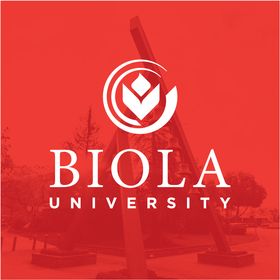 Bachelor of Science in Applied Psychology
Bachelor of Science in Applied Psychology
La Mirada, California
Between Anaheim and Los Angeles is La Mirada, California, home to Biola University. This private evangelical institution enjoys a 95-acre campus adjacent to the La Mirada Community Regional Park with its open green spaces that serve as an oasis amid a high density urban environment. Close to Disneyland, beautiful, sundrenched California beaches and the iconic Hollywood Bowl, Biola stands out as a spiritual oasis amid a very secular backdrop. The school was founded in 1908 as the Bible Institute of Los Angeles (later shortened to the acronym ‘Biola’). The stated mission of the university is to help students “think biblically about everything” while offering a “biblically centered education, intentional spiritual development and vocational preparation within a unique learning community where all faculty, staff and students are professing Christians.” This vision is demonstrated by the core course requirement of 30 credit hours of Bible and Theology studies for all undergraduate students. Biola University is accredited by the WASC Senior College and University Commission and holds several other program-specific accreditations. The University comprises the Cook School of Intercultural Studies, the Crowell School of Business, the School of Education, the School of Fine Arts and Communication, the School of Humanities and Social Sciences, the School of Science, Technology and Health, the Talbot School of Theology and the Rosemead School of Psychology. The Rosemead School of Psychology offers residential Doctorate Degree programs, however, the University has a 100% online Bachelor of Science in Applied Psychology for undergraduate students.
The student body at Biola, some 6,000 strong (including over 4,000 undergraduate students), appreciates the student-to-faculty ratio of 15 to 1. While not the most selective school in the country, Biola admits only 65% of applicants; however, loyalty and determination are prevalent character traits among the matriculating students as the school boasts a staggering 84% retention rate and an equally impressive graduation rate of 72%. Nearly all starting undergraduate students receive at least one form of financial aid, in the form of scholarships and grants and/or government-sponsored financial assistance.
8. Toccoa Falls College
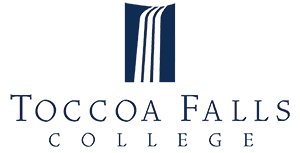 Bachelor of Science in Counseling Psychology
Bachelor of Science in Counseling Psychology
Toccoa Falls, Georgia
Situated in the rugged foothills of the Blue Ridge Mountains of northeastern Georgia, Toccoa Falls College takes its name from the picturesque 186’ Toccoa Falls (taller than Niagara Falls). This private, non-profit Christian liberal arts school boasts a 1,100-acre campus filled with green spaces and lush mountain foliage. 100 miles northeast of Atlanta, Toccoa Falls College is affiliated with the Christian and Missionary Alliance denomination. R.A. Forrest founded the college in 1907 with a vision to “glorify God through seeking and developing Christian servant leaders who will impact the world with the love and message of Jesus Christ.” Embracing the founder’s ideals, the school sets itself up to “be known as a premier Christian college that uniquely integrates biblical truth, academic excellence, and intentional spiritual formation within a caring Christian community.” The college is accredited by the Southern Association of Colleges and Schools (as of 1983) and contains the School of Arts & Sciences, the School of Christian Ministries, the School of Professional Studies and the newly launched Fetterman School of Nursing.
Toccoa Falls College offers ten 100% online Bachelor Degree programs including a Bachelor of Science in Counseling Psychology. The coursework is expansive and includes a core in Bible and Theology. A relatively small school, Toccoa Falls College provides a student-to-faculty ratio of 14 to 1. All incoming students receive at least one form of student financial aid, be it in the form of institutional grants, scholarships or government-sponsored financing. Toccoa Falls College is also rather selective in its admission practices, admitting just over 50% of all applicants. Once enrolled, the school reflects a 70+% retention rate and a graduation rate of almost 50%.
7. Azusa Pacific University
 Bachelor of Arts in Applied Psychology
Bachelor of Arts in Applied Psychology
Azusa, California
Outside of Los Angeles, California in the San Gabriel Valley sits Azusa – home to Azusa Pacific University. Set in the warm climate of southern California, Azusa Pacific University is an evangelical Christian school that is a leader in the Council for Christian Colleges and Universities. Founded in 1889, Azusa Pacific University (APU) started as the first bible college on the west coast – it started as the Training School for Christian Workers and was dedicated to preparing students for service and ministry. Now a broadly diverse university, APU offers over 100 undergraduate and graduate degree programs at the Azusa campuses as well as six regional locations within southern California and online. APU’s schools and colleges are separated by local geography: the East Campus is host to College of Liberal Arts and Sciences, School of Business and Management and the School of Music and the Arts; while the Azusa Pacific Seminary, School of Nursing, School of Behavioral and Applied Sciences, School of Education, and the School of Theology are located on the West Campus – as is the Richard and Vivian Felix Event Center and the Segerstrom Science Center. The school holds over a dozen professional accreditations including the WASC Senior College and University Commission (WSCUC).
Azusa Pacific University holds the stated mission to be “an evangelical Christian community of disciples and scholars who seek to advance the work of God in the world through academic excellence in liberal arts and professional programs of higher education that encourage students to develop a Christian perspective of truth and life.” APU’s student body of some 10,000 students includes approximately 6,000 undergraduates who appreciate the student-to-faculty ratio of 12 to 1. APU’s University College offers a 100% online Bachelor of Arts in Applied Psychology – one of ten online undergraduate degree programs. The school’s admission rate of 61%, retention rate of 86% and graduation rate of 70% point to the success of the school’s programs.
6. Belhaven University
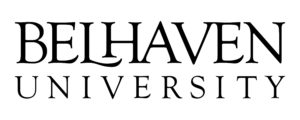 Bachelor of Arts in Applied Psychology
Bachelor of Arts in Applied Psychology
Jackson, Mississippi
Jackson, Mississippi has been named one of the best cities for entrepreneurs in the United States. Perhaps its unique blend of historic charm and economic center as the capital of the state work together to earn this distinction. One positive feature of Jackson is Belhaven University, set in a historic area as a quiet oasis amid a bustling metropolis. Belhaven was founded in 1883 as the result of a merger of the Mississippi Syndical College and McComb Female Institute. Over one hundred thirty years later, Belhaven offers certificate programs, undergraduate degrees (Associate and Bachelor), graduate degrees, online programs and adult/continuing education programs – over 70 programs in all. A decidedly Christian institution, Belhaven’s stated Mission is to equip students “academically and spiritually to serve Christ Jesus in their careers, in human relationships, and in the world of ideas.” Belhaven University enjoys the distinction of being one of just 36 nationally accredited universities in each of the major arts (music, theatre, visual art, and dance); the school is one of two Christian universities to be recognized by the White House Stem Initiative. The broad coursework and degree programs include eight online Bachelor’s Degrees, including a Bachelor of Arts in Applied Psychology.
The Southern Association of Colleges and Schools Commission on Colleges (SACSCOC) provides accreditation credentials to Belhaven University and endorses the school to award Associate, Baccalaureate and Master degrees. The student body, some 4,750 strong, appreciates the low student-to-faculty ratio of 11 to 1. Applicants to the university quickly discover the selectivity the school presents – just 43% of applicants are admitted. Once in, over 65% of students remain enrolled; the school’s graduation rate is 36%. All starting students receive one or more forms of student financial aid, be it in grants, scholarships or government-sponsored programs.
5. North Greenville University
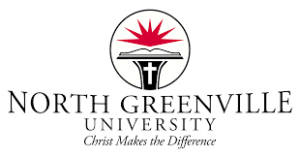 Bachelor in Applied Psychology
Bachelor in Applied Psychology
Tigerville, South Carolina
20 miles from Greenville, SC, in the beautiful foothills of the Blue Ridge Mountains, is Tigerville, SC, which is home to North Greenville University. This private, 4-year Christian liberal arts school is set on a picturesque campus and comprises seven individual colleges: College of Business & Sport Professions, College of Christian Studies, College of Communication, College of Education, College of Fine Arts, College of Humanities and College of Science and Math. It is within the College of Science and Math that the school’s Psychology degree is offered (both on campus and online). North Greenville University was first chartered in 1904 and strives to be a “Christ-centered community of genuine, caring faculty and staff members who are committed to providing every student with not only a quality educational experience, but also hands-on opportunities for spiritual growth and service on campus, in the local community, and around the world.” The school is affiliated with the South Carolina Baptist Convention and Southern Baptist Convention; it is accredited by the Southern Association of Colleges and Schools Commission on Colleges (SACSCOC).
North Greenville University is recognized as one of the most notable conservative Christian institutions not only in the Southeast, but nationally. The school offers its Bachelor degree in Applied Psychology as a 100% online program – one of six online degree programs available. On campus or online, all students appreciate the low student-to-faculty ratio (14-1) and the availability of financial aid – nearly all beginning students receive one or more forms of aid, including grants, scholarships or government-sponsored assistance. North Greenville University is fairly selective, admitting less than 60% of all applicants. Not unrelated to the admission rate, the school boasts a retention rate of 70% and a graduation rate of 57%. Current enrollment tops 2,500 (both undergraduate and graduate students).
4. Judson University
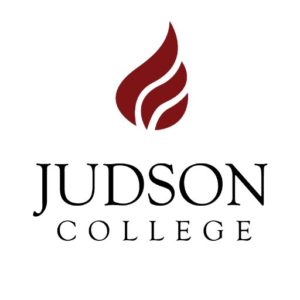 Bachelor of Science in Applied Psychology
Bachelor of Science in Applied Psychology
Elgin, Illinois
Near the heart of the Midwest, Elgin, Illinois is home to Judson University, a private, evangelical Christian liberal arts school. Less than 50 miles from Chicago, the sizeable campus sits along the Fox River, which provides a natural beauty and ambiance to the academic environment. Founded as Judson College in 1963, the University was launched from the undergraduate division of the Northern Baptist Theological Seminary (which itself dates to 1913). The school takes its name in honor of one of the first foreign missionaries, Adoniram Judson, who spent over 35 years serving in Burma (now known as Myanmar) in the 19th Century. Judson University, whose motto is Christus Lux Mundi (Christ, Light of the World), identifies their primary mission as reflecting “the Church at work in higher education, equipping students to be fully developed, responsible persons who glorify God by the quality of their personal relationships, their work, and their citizenship within the community, the nation and the world.” True to the call for stewardship, the university hosts a LEED Gold certified building – among the most energy-efficient buildings in the United States – which adds to the school’s reputation for being “green.”
Judson University is accredited by the Higher Learning Commission; among the over three dozen undergraduate majors is a Bachelor’s degree in Applied Psychology online, which also offers additional, specific coursework in four concentrations: Criminal Justice Concentration, Child and Family Concentration, Pre-Clinical/Counseling Concentration, and Pre-Social Services Concentration. This degree program is 100% online. While this program is just one degree program at Judson University’s Department of Social Sciences, students appreciate the low student-to-faculty ratio (9:1) and available financial aid (of which nearly all starting student take advantage). Judson University also has a student retention rate of 74% (which is very good) and a graduation rate of 64% (which is in the higher range among similar schools).
3. Houston Baptist University
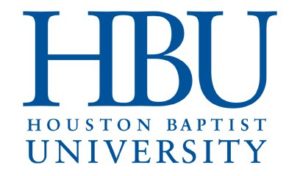 Bachelor of Arts in Psychology: Christian Counseling
Bachelor of Arts in Psychology: Christian Counseling
Houston, Texas
Houston, Texas is one of the largest cities in the United States (by population and acreage). It is also home to Houston Baptist University, which sits between the high-density neighborhoods of Sharpstown and Robindell and acts as a green oasis amid development, hustle and bustle. The school was founded by action of the Baptist General Convention of Texas on November 15, 1960, and received its Charter at that time. The aim of the College founders was the establishment of a Christian College of the highest order in the city of Houston that stressed quality of life as well as quality of learning. This is shown in the stated mission “to provide a learning experience that instills in students a passion for academic, spiritual, and professional excellence as a result of our central confession, “Jesus Christ is Lord”.” Houston Baptist University is accredited by the Southern Association of Colleges and Schools Commission on Colleges and comprises eight colleges and schools: Archie W Dunham College of Business, College of Education & Behavioral Sciences, College of Science and Mathematics, School of Christian Thought, School of Fine Arts, School of Humanities, School of Nursing and Allied Health and the Honors College. In addition to a plethora of residential programs, Houston Baptist University offers eight online programs including Bachelor of Arts in Psychology, Bachelor of Arts in Psychology-Christian Counseling and Bachelor of Arts in Psychology-Marriage and Family Studies.
The student body (over 2,300 in number) appreciates the competitive student-to-faculty ratio of 16 to 1. Though a smaller school than many, the admission rate of just 35% of applicants demonstrates their selectivity in screening potential degree candidates. Once enrolled, over 93% of students receive at least one form of student financial aid in the form of scholarships, grants and/or government-sponsored financial assistance. Students show their loyalty to the school in a 67% retention rate; the graduation rate for the university is 44%.
2. Faulkner University
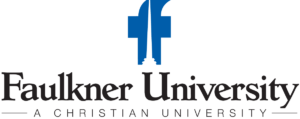 Bachelor of Science in Psychology (various concentrations)
Bachelor of Science in Psychology (various concentrations)
Montgomery, Alabama
The east side of Montgomery, Alabama is a highly developed mixture of medium-density housing, commercial and shopping areas. Nestled in the middle of it all is Faulkner University, a Christian liberal arts school with its roots dating to 1942 when the Montgomery Bible College was founded by Dr. Rex Turner, Dr. Leonard Johnson and Joe Greer. The vision held by these founders was to create an institution that provided preacher training and education based in God’s Holy Word. Renamed Alabama Christian College in 1953, the school was relocated to its current location in 1964. The college was renamed Faulkner University in 1985 to honor Dr. James Faulkner, former mayor of Bay Minette, AL and Alabama State Senator who also served as Trustee of the school. The stated mission of the school is “to glorify God through education of the whole person, emphasizing integrity of character in a caring, Christian environment where every individual matters every day.” Faulkner University comprises five colleges: the Alabama Christian College of Arts and Sciences, the Harris College of Business and Executive Education, the V.P. Black College of Biblical Studies, the College of Education, and the Thomas Goode Jones School of Law. In addition to a vast array of residential programs, Faulkner offers several 100% online degree programs including Bachelor of Science in Counseling Psychology, Bachelor of Science in Forensic Psychology, Bachelor of Science in General/Clinical Psychology, Bachelor of Science in Health & Rehabilitation Psychology and Bachelor of Science in Sports Psychology.
The student body, over 2,500 in number, appreciate the low student-to-faculty ratio of 11 to 1. Faulkner is a fairly selective school, admitting about 45% of all applicants. Of those matriculating students, over half receive at least one form is student financial aid in the form of scholarships and grants and/or government-sponsored financial aid. The school’s retention rate is 54% year over year and the graduation rate is 33%.
1. Liberty University
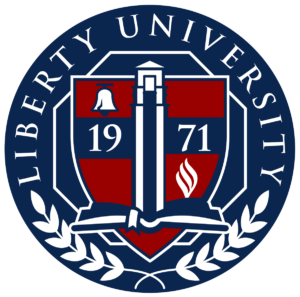 Bachelor of Science in Psychology (various concentrations)
Bachelor of Science in Psychology (various concentrations)
Lynchburg, Virginia
Lynchburg, Virginia is home to the fifth largest university in the country, Liberty University; Liberty is also the world’s largest Christian university. Carnegie Classification places Liberty University in the category of doctoral research university; this institution offers hundreds of degree programs including over 280 online programs. Liberty University comprises 17 colleges and schools, which include Liberty University School of Law, the Rawlings School of Divinity, and the Liberty University College of Osteopathic Medicine, Aeronautics, Arts & Sciences, Behavioral Sciences, Business, Communication & Digital Content, Education, Engineering & Computational Sciences, Health Sciences, Government, Music, Nursing, and Visual & Performing Arts. Liberty University’s stated mission, as first visualized by its founder, Dr. Jerry Falwell, is to develop “Christ-centered men and women with the values, knowledge, and skills essential to impact the world.” Set in the historic foothills of the Blue Ridge Mountains of Virginia, the expansive campus provide a spectacular backdrop of natural beauty enhancing the academic atmosphere.
The school received accreditation from the Southern Association of Colleges and Schools Commission on Colleges (SACSCOC) and maintains other affiliations consistent with the school’s doctrine. Among the dozens of online degree programs, Liberty University offers a Bachelor of Science in Psychology which is available with seven “cognates” to add specialty to the degree: Addictions and Recovery, Christian Counseling, Criminal Psychology, Crisis Counseling, Developmental Psychology, Life Coaching, and Military Resilience.
Additionally, there is a Bachelor of Science in Criminal Justice, which offers a Criminal Psychology cognate. All of these programs are 100% online. The university also has an expansive career counseling and placement program for all graduates. Because of the school’s reputation, admission presents a high threshold as only around 24% of all applicants are admitted. Financial aid is available; nearly all full-time undergraduate students (within the entire university) receive some form of assistance.
Related Resources: